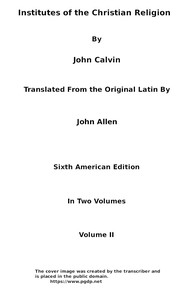Institutes of the Christian Religion (Vol. 2 of 2) by Jean Calvin
"Institutes of the Christian Religion (Vol. 2 of 2)" by John Calvin is a theological work written in the 16th century. This text serves as a comprehensive exposition of Protestant Christian doctrine, particularly focusing on the concepts of justification, grace, and the moral implications of faith. As a principal work of Calvinism, it systematically analyzes the relationship between faith and works in the context of salvation, establishing a theological framework for understanding
Christian belief and practice. At the start of this volume, the author delves into the nature of human righteousness, categorizing people based on their spiritual condition and urging readers to consider the state of their hearts in relation to God. He argues that righteousness cannot be achieved through human efforts or adherence to the law, as all human works are ultimately flawed and deserving of condemnation. Instead, Calvin emphasizes that true righteousness and justification come solely from faith in Christ and the grace of God, making the case that one's standing before God rests entirely on divine mercy rather than personal merit. This opening portion sets the stage for further exploration of these critical themes throughout the text. (This is an automatically generated summary.)
Read or download for free
| How to read | Url | Size | |||
|---|---|---|---|---|---|
| Read now! | https://www.gutenberg.org/ebooks/64392.html.images | 2.7 MB | |||
| EPUB3 (E-readers incl. Send-to-Kindle) | https://www.gutenberg.org/ebooks/64392.epub3.images | 818 kB | |||
| EPUB (older E-readers) | https://www.gutenberg.org/ebooks/64392.epub.images | 854 kB | |||
| Kindle | https://www.gutenberg.org/ebooks/64392.kf8.images | 1.5 MB | |||
| older Kindles | https://www.gutenberg.org/ebooks/64392.kindle.images | 1.3 MB | |||
| Plain Text UTF-8 | https://www.gutenberg.org/ebooks/64392.txt.utf-8 | 2.0 MB | |||
| Download HTML (zip) | https://www.gutenberg.org/cache/epub/64392/pg64392-h.zip | 761 kB | |||
| There may be more files related to this item. | |||||
About this eBook
| Author | Calvin, Jean, 1509-1564 |
|---|---|
| Translator | Allen, John, 1771-1839 |
| Title | Institutes of the Christian Religion (Vol. 2 of 2) |
| Note | Reading ease score: 57.7 (10th to 12th grade). Somewhat difficult to read. |
| Note | Wikipedia page about this book: https://en.wikipedia.org/wiki/Institutes_of_the_Christian_Religion |
| Credits | Richard Hulse, Heather Clark, David King, and the Online Distributed Proofreading Team at http://www.pgdp.net. (This file was produced from images generously made available by The Internet Archive.) |
| Language | English |
| LoC Class | BX: Philosophy, Psychology, Religion: Christianity: Churches, Church movements |
| Subject | Theology, Doctrinal -- Early works to 1800 |
| Subject | Reformed Church -- Doctrines -- Early works to 1800 |
| Category | Text |
| EBook-No. | 64392 |
| Release Date | Jan 26, 2021 |
| Most Recently Updated | Jun 5, 2022 |
| Copyright Status | Public domain in the USA. |
| Downloads | 374 downloads in the last 30 days. |
| Project Gutenberg eBooks are always free! | |

